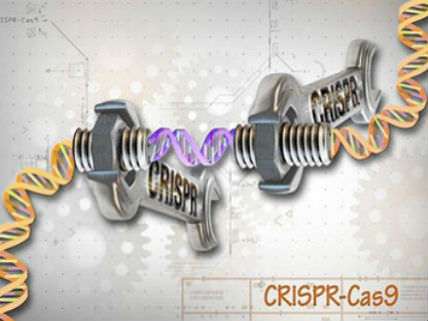Gene-Editing Human Embryos Is Ethical
Bioethicists and scientists who say otherwise are wrong.

A bioethical firestorm erupted last week when Chinese researchers at Sun Yat-Sen University published research in the journal Protein & Cell detailing how they had tried to use the CRISPR gene-editing tool to change the genomes of 86 human embryos. The team, led by the gene-function researcher Junjiu Huang, used embryos from IVF clinics that had been double-fertilized, giving them three sets of genes instead of the usual two. Such triploid embryos cannot grow into babies.
The researchers sought to make changes in a gene that causes the sometimes fatal blood disorder beta-thalassemia. The aim is to find out just how effectively and efficiently CRISPR can make changes to genes in human embryos, with the ultimate goal of altering embryos such that any subsequently born babies will be disease-free. This is known as germ-line modification, since the corrected gene will be passed down to subsequent progeny.
The Chinese scientists essentially ignored recent calls for a moratorium on editing human reproductive cells and embryos. The month before their paper appeared, Science recommended that such research be "strongly discourage[d]" while the "societal, environmental, and ethical implications of such activity are discussed among scientific and governmental organizations." Meanwhile, Nature had editorialized that "genome editing in human embryos using current technologies could have unpredictable effects on future generations. This makes it dangerous and ethically unacceptable….At this early stage, scientists should agree not to modify the DNA of human reproductive cells." Some 40 countries have preemptively banned germline genetic engineering. (The United States is not among them.)
Not too surprisingly, both Science and Nature reportedly declined to publish Junjiu Huang's study on "ethical" grounds.
The research naturally provoked some bioethical handwringing. "No researcher has the moral warrant to flout the globally widespread policy agreement against altering the human germline," declared Marcy Darnovsky, the executive director of the Center for Genetics and Society. "The medical risks and social dangers of human germline modification cannot be overstated." She further urged, "We need to act immediately to strengthen the global policy agreements that put human germline modification off limits." In The Christian Science Monitor, University of Wisconsin at Madison bioethicist Alta Charo asked, "Do we really want to have the power not just to select among the choices given to us by nature, but to create entirely new choices of our own specification?"
My short answer: Yes.
In what terrible bioethical violations did the Chinese researchers engage? None. The embryos were grown to the eight-cell stage, and none of them could ever have developed into babies. No germline cells with any potential to develop into people were modified. Of the 71 embryos that survived the experiment, 54 were genetically tested. Of these, 28 embryos had the target gene "spliced." Only four contained all of the replacement genetic material, and even those were mosaics—that is, not every cell had been modified.
The researchers also found a significant number of "off-target" effects, in which the CRISPR complex had modified the wrong genes. Off-target genetic modifications could, of course, produce deleterious genetic mutations.
The poor accuracy and the high number of off-target effects in these experiments could stem from using embryos with three sets of chromosomes. "It is possible that the DNA repair mechanisms that are more likely to lead to errors have been activated in such abnormal embryos," suggested Robin Lovell-Badge, a stem cell biologist at the Crick Institute in London, in an interview with The Independent. The numerous off-target effects might also result from the fact that the Chinese researchers did not use the most up-to-date version of CRISPR editing.
Nevertheless, the Chinese experiment is exactly the kind of research that needs to be done as part of the scientific and clinical process of figuring out how and when to use CRISPR to treat disease or repair defective genes. The research has provided insights into what can go wrong and highlights the fact that this technology is not yet ready for the clinic.
In contrast with Darnovsky's pseudoethical bloviation, the Oxford bioethicists Chris Gyngell and Julian Savulescu cogently argue that there is a "moral imperative to research editing embryos." They point out that the Chinese research is "important precisely because it increases our understanding about some of the risks involved in targeting humans with current gene editing techniques." The two further assert that the earlier calls for a moratorium on such research are based on concerns that "are vague, emotive, and devoid of any real rational force. Many technologies have unpredictable effects and could potentially be used non-therapeutically. This doesn't justify censorship [by journals] of potentially life-saving research." That is entirely correct.
If using refined and effective CRISPR gene-editing techniques to cure disease or correct defective genes is moral, then it is immoral to slow progress toward achieving that goal.


Show Comments (147)